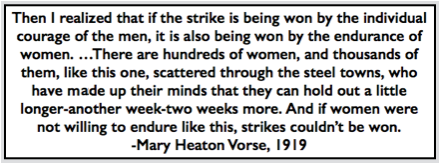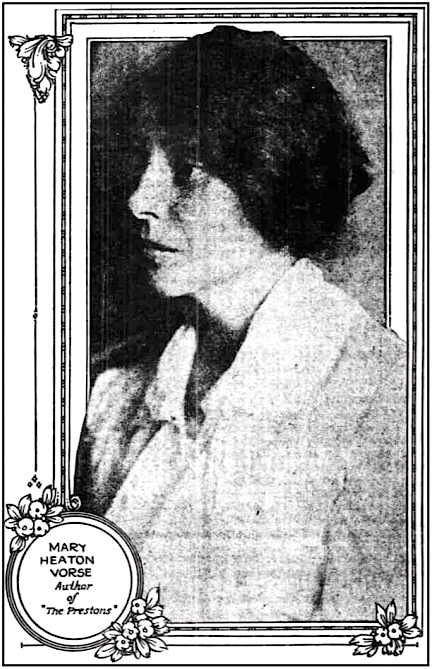 ———-
———-
Hellraisers Journal – Saturday November 1, 1919
Pittsburgh, Pennsylvania – The Steel Strikers: Courageous Men, Enduring Women
From The Quarry Workers Journal of November 1919:
CONDITIONS AMONG [STEEL] STRIKERS
AS SEEN BY A WOMAN
—–
By Mary Heaton Vorse,
Author of “The Prestons.” Etc.
—–[Part I.]
This week the commissary stores are being opened in all the steel towns. For six weeks the strikers had nothing. They have been living on their savings; some who have had no savings, have existed from hand to mouth, picking up a chance bit of work here and there and being helped out by their friends.
The first strike relief which will have been given will be the groceries given out twice a week from the commissary stores. Not everyone can have these groceries. They are for those who are starving or on the edge of want, for it would be unthinkable at this stage of organized labor that any one should be forced to scab by hunger.
You do not need much imagination to understand what endurance it has taken on the part of the rank and file to stay out on strike for six weeks without strike benefit or relief. It is going to take even more endurance from now on, when the narrow line will have to be drawn between those actually in want and those nearly in want.
Yesterday I saw how that was being done. When a striker applies for re lief, one of the strike committee goes around to talk the matter over with the family. I went out in Pittsburgh with a Polish fellow-worker who was going out to make such visits of investigation.
We had some difficulty in finding the house where the strikers live. We went down back alleys, past refuse dumps that seemed as venerable as the dilapidated meeting house on the corner. Like everything else in this neighborhood, it was falling to pieces. The paint had scaled from its pillars, but it spoke of a former day before all the mild red brick of the houses had been defiled with the grime soot, and when the well to do, comfortable families lived a family in a house, instead of a family in a room.
All America has heard how richly the steel workers have been paid. They have heard how their wives buy fur coats, and how they go to work in their cars. There have been among the highly skilled some who have made good money. The average man is no better off than he ever was. He lives as he always did, in a foul and crowded slum in the cities where his children from one year’s end to another never see a green blade of grass, or in bleak monotonous houses in the country, plastered to hillsides, where every green thing is blackened by the smoke of the mills. What small share he has had in the colossal profits which have been made by steel has been wiped off the slate by the cost of living. For under our system of profits nothing but profits matters.
We finally found the house. To go in, we had to bend down because laundry was hanging in the front hall. We went into a back yard, bricked over and littered with debris. The only sweet thing on which the eye could rest were the children playing in the yard. It was separate from the other yards by high blackened palings. It was as cheerful as a well. But the children played there.
The room we went into was clean, but as bleak as the yard. On either side of the stove were two chairs with out backs. There was a table, a mechanical cradle rocked a baby to and fro-tick, tack-tock, tack, in a staccato rythm. There were the two chairs in the room, and that was all, except white curtains at the window-patched and darned-but, in spite of all invading grime, white. The woman called her husband from the inner room. This room, where they slept and the four children with them, was black as a cellar, with much less ventilation.
For a while they talked together in Polish, and I made friends with the children. The conversation between the member of the strike committe and the strikers was very earnest. I don’t think they ever smiled. But all through it ran the rippling laughter of the children. These people had brought with them such sound, good blood, that their children even in these conditions were gay and bonny and full of laughter. They were three, four and five years old, and there was the baby of eleven months.
Presently the talk came to an end. They had decided.
“They have decided,” said my guide, “that they can wait three weeks more before they come to the commissary.”
They had nothing, and they could wait three weeks more! In some houses you will go to, you can find the evidence of the higher wages. A comfortable chair; a sewing machine; a better type of stove, but here there was no sign of anything of that kind. Bare walls and emptiness, that was all. Babies coming in such rapid succession had eaten up all this man could earn.
Then I realized that if the strike is being won by the individual courage of the men, it is also being won by the endurance of women. Women like this-young mothers, burdened down by the care of their young children. Women who have almost no diversion, who live isolated by poverty from all that is beautiful in life, whose eyes never rest on anything fair except the faces of their own children. There are hundreds of women, and thousands of them, like this one, scattered through the steel towns, who have mode up their minds that they can hold out a little longer-another week-two weeks more. And if women were not willing to endure like this, strikes couldn’t be won.
Yet it is a terrible thing to think that this endurance must be.
[Photograph, emphasis, and paragraph breaks added.]
~~~~~~~~~~~~~~~~~~~~~~
SOURCE
The Quarry Workers Journal
(Barre, Vermont)
-Nov 1, 1919
https://www.newspapers.com/image/405049859
IMAGE
MHV, Author of Prestons, NYS p37, Dec 1, 1918
https://chroniclingamerica.loc.gov/lccn/sn83030431/1918-12-01/ed-1/seq-37/
See also:
Tag: Great Steel Strike of 1919
https://weneverforget.org/tag/great-steel-strike-of-1919/
Tag: Mary Heaton Vorse
https://weneverforget.org/tag/mary-heaton-vorse/
Men and Steel
-by Mary Heaton Vorse
New York, Boni and Liveright, 1920
https://archive.org/details/mensteel00vors/page/n5
Mary Heaton Vorse
https://en.wikipedia.org/wiki/Mary_Heaton_Vorse
https://spartacus-educational.com/USAvorse.htm
~~~~~~~~~~~~~~~~~~~~~~~~~~~~~~~~~~~~~~~~~~~~~
Bread and Roses – Bronwen Lewis

